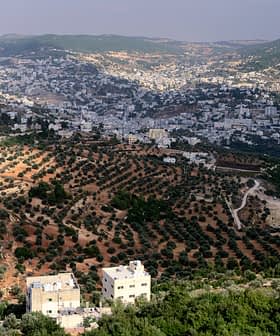Farmers and Officials in Jordan Work to Protect Millennial Olive Trees

Jordan’s ancient olive trees are threatened by climate change and deforestation, prompting efforts to protect them, including new legislation and awareness campaigns. The trees, some dating back 5,000 years, are considered national treasures and are being uprooted and sold to foreigners, leading to higher prices and increased demand for olive oil from these historic trees.
Revered as national treasures, Jordan’s olive trees are being threatened by climate change and deforestation by developers enamored by their history and beauty.
Growing demand for unique garden ornaments has led to the trees being uprooted and sold to foreigners worldwide and high-end hotels. Efforts are underway to save and protect them.
Farmers are basically preserving our culture in a bottle. They are beginning to take care of these ancient trees, and with greater awareness, and have also made a point to differentiate them from regular olive oils.
Some of these trees date back 5,000 years, making them “living monuments,” said Nehaya Al-Muhaisen, former director of the olive directorate at the Ministry of Agriculture and founder of the Arab Olive Oil Women’s Network.
“Since our ancient trees are sensitive to relocation, new government legislation limits transportation and removal of them,” she told Olive Oil Times. “The Ministry of Interior, together with the police, are working to prevent transport operations, except in very exceptional cases.”
See Also:Celebrating South America’s Historic Olive TreesJordan’s Ministry of Culture further aims to add the country’s olive trees to the UNESCO Intangible Cultural Heritage List. The hope is that the recognition will further protect them. The government is also developing a plan to engage public involvement through QR codes placed on locally-produced olive oils.
“At first, researchers thought our olive trees were planted during the Roman empire, around 2,000 years ago, but found that they were cultivated way before then,” Al-Muhaisen said. “They were cultivated thousands of years ago and belong to the legacy of Greater Syria. As a result, they are rare and lucrative to sell.”
Greater Syria (Bilad al-Sham), which spans the modern countries of Syria, Lebanon, Israel, Jordan and Palestine, as well as some parts of Turkey, is the birthplace of the olive tree. The earliest variety is known as Mehras, according to the Mehras Cooperative Society.
Al-Muhaisen noted that the Ministry of Agriculture has spread awareness of the economic value of the oldest trees. As a result, “their owners have a desire to keep them and benefit from them.”
“In the past, these ancient trees were just seen as regular olive trees, but today, they have a special protected status,” she said. “They have become the symbol of the grandmother, and you take care of your grandmother.”
This changed mentality has prompted producers to repackage olive oil from millennial trees into bottles with unique designs. “Farmers are basically preserving our culture in a bottle,” Al-Muhaisen said.
“They are beginning to take care of these ancient trees, and with greater awareness, and have also made a point to differentiate them from regular olive oils at trade shows and special exhibitions,” she added.
In Jordan, high olive oil prices are attributed to rising production costs, especially for labor.
On average, olive oil costs approximately 6 Jordanian dinars (€7.68) per liter, while a bottle of olive oil from the country’s historic trees can run 15 to 20 Jordanian dinars (€19.19 to €25.58) per liter, according to Al-Muhaisen.
Despite higher prices, demand is rising. “These ancient olive oils have a unique taste,” Al-Muhaisen said. “They also represent high quality and a rich history. So, the margins are justified. Because of its historical value, prices could rise to 50 Jordanian dinars (€63.96) per liter.”
Experts predict that Jordanian olive oil production will rise 30 percent this year. “We expect about 33,000 tons, with 20 percent from ancient trees,” Al-Muhaisen said. “The number of fruitful olive trees is estimated at approximately 12 million, of which about 20 percent or so are the ancient trees,” she added.
Approximately 200,000 people are involved in the olive harvest season. “The Jordanian olive sector is one of the most important agricultural economic sectors, as it contributes effectively to the GDP, with an investment volume of more than one billion Jordanian dinars (€1.28 billion),” Al-Muhaisen said. “It provides a source of income for more than 80,000 Jordanian rural families.”
“In my women’s network, women from olive oil families have started to change the production and storage of specific varieties, including the ancient varieties,” she added. “The workshops we organize reflect on the new generation of olive oil producers.”
Climate change challenges the sector, including the security of ancient trees. The heatwaves have increased the use of fertilizers and forced farmers to resort to supplementary irrigation to sustain productivity.
“Increasing the establishment of water harvesting pits capable of absorbing rain and flash floods could reduce their danger,” Al-Muhaisen said.
“It is also possible to cultivate different varieties that are more resistant to climate change conditions in Jordan,” she added. “The Mehras variety, for instance, which falls under the ancient varieties, is one of the most resistant.”









